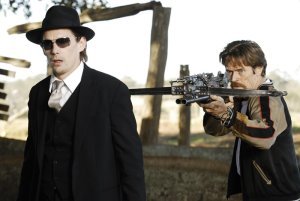Daybreakers
In 2019, the most precious natural resource... is us.

|
In 2019, a decade after a pandemic established vampires as the dominant species, the number of humans (and the supply of human blood) has dwindled to a dangerous low. Edward (Hawke) is a haematologist researching a synthetic blood substitute so that his company won’t need to farm humans for blood. He realises that owner Charles (Neill) views the blood substitute as a reprieve to allow the human population to replenish itself. This sets in motion a chain of events leading Edward to Elvis (Dafoe), an ex-vampire who may hold the key to humanity's survival.
In today's landscape, the prevailing image of vampires is that they sparkle (Twilight) or have lots of sex (True Blood), so it is nice to see a film putting a fresh spin on the motif. Hawke has stated that Daybreakers should be viewed as an allegory for society's unsustainable consumption of resources. This is most transparent in the subplot dealing with the subsider epidemic; when deprived of blood for a prolonged period, vampires mutate into subsiders, aggressive bat-like creatures. The lower strata of society are the first to be priced out of the market, but eventually the rest of the vampires begin to feel the pinch. Substitute oil for blood, and this could be our future.
Admittedly, there are some logical leaps you have to take as a viewer. The most troubling is why the rational vampires of Daybreakers never figure out that hunting humans into extinction is hardly the best way to secure their future food supply. However, this lack of foresight seems to be precisely the sort of thing the film wants to warn us about. Ultimately then, what makes Daybreakers interesting is the way it has packaged an environmental issue in the trappings of what seems to be today's hottest film genre.
Ian Chung
More Information | Back to Previous Schedule | This Season | BBFC Classification Guidelines
Screenings of this film:
| 2009/2010 Summer Term – (35mm) |


